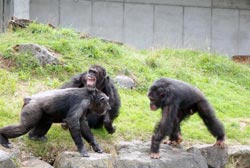Chimpanzees have policemen, too

Mostly high-ranking males or females intervene in a conflict. Picture: Claudia Rudolf von Rohr<br>
Anthropologists from the University of Zurich reveal that chimpanzees mediate conflicts between other group members, not for their own direct benefit, but rather to preserve the peace within the group. Their impartial intervention in a conflict – so-called “policing” – can be regarded as an early evolutionary form of moral behavior.
Conflicts are inevitable wherever there is cohabitation. This is no different with our closest relatives, the chimpanzees. Sound conflict management is crucial for group cohesion. Individuals in chimpanzee communities also ensure that there is peace and order in their group. This form of conflict management is called “policing” – the impartial intervention of a third party in a conflict. Until now, this morally motivated behavior in chimpanzees was only ever documented anecdotally. However, primatologists from the University of Zurich can now confirm that chimpanzees intervene impartially in a conflict to guarantee the stability of their group. They therefore exhibit prosocial behavior based on an interest in community concern.
The more parties to a conflict there are, the more policing there is
The willingness of the arbitrators to intervene impartially is greatest if several quarrelers are involved in a dispute as such conflicts particularly jeopardize group peace. The researchers observed and compared the behavior of four different captive chimpanzee groups. At Walter Zoo in Gossau, they encountered special circumstances: “We were lucky enough to be able to observe a group of chimpanzees into which new females had recently been introduced and in which the ranking of the males was also being redefined. The stability of the group began to waver. This also occurs in the wild,” explains Claudia Rudolf von Rohr, the lead author of the study.
High-ranking arbitrators
Not every chimpanzee makes a suitable arbitrator. It is primarily high-ranking males or females or animals that are highly respected in the group that intervene in a conflict. Otherwise, the arbitrators are unable to end the conflict successfully. As with humans, there are also authorities among chimpanzees. “The interest in community concern that is highly developed in us humans and forms the basis for our moral behavior is deeply rooted. It can also be observed in our closest relatives,” concludes Rudolf von Rohr.
Literature:
Claudia Rudolf von Rohr, Sonja E. Koski, Judith M. Burkart, Clare Caws, Orlaith N. Fraser, Angela Ziltener, Carel P. van Schaik. Impartial third-party interventions in captive chimpanzees: a reflection of community concern. PLoS ONE, March 7, 2012. doi: 10.1371/journal.pone.0032494
Contact:
Prof. Carel van Schaik
Anthropological Institute and Museum
University of Zurich
Tel.: +41 44 635 54 10
Email: vschaik@aim.uzh.ch
Media Contact
More Information:
http://www.uzh.chAll latest news from the category: Life Sciences and Chemistry
Articles and reports from the Life Sciences and chemistry area deal with applied and basic research into modern biology, chemistry and human medicine.
Valuable information can be found on a range of life sciences fields including bacteriology, biochemistry, bionics, bioinformatics, biophysics, biotechnology, genetics, geobotany, human biology, marine biology, microbiology, molecular biology, cellular biology, zoology, bioinorganic chemistry, microchemistry and environmental chemistry.
Newest articles

Sea slugs inspire highly stretchable biomedical sensor
USC Viterbi School of Engineering researcher Hangbo Zhao presents findings on highly stretchable and customizable microneedles for application in fields including neuroscience, tissue engineering, and wearable bioelectronics. The revolution in…

Twisting and binding matter waves with photons in a cavity
Precisely measuring the energy states of individual atoms has been a historical challenge for physicists due to atomic recoil. When an atom interacts with a photon, the atom “recoils” in…

Nanotubes, nanoparticles, and antibodies detect tiny amounts of fentanyl
New sensor is six orders of magnitude more sensitive than the next best thing. A research team at Pitt led by Alexander Star, a chemistry professor in the Kenneth P. Dietrich…





















